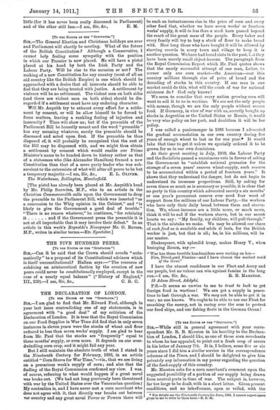Tab DECLARATION OF LONDON.
[TO TIM EDITOR Or TIM "SPECTATOR."] am glad to find that Mr. Edward Paul, although in your last issue contradicting one of my statements, is in agreement with "a good deal" of my criticism of the Declaration of London. It is true that the Royal Commission on our Food Supplies in War Time did find that in only seven instances in eleven years were the stocks of wheat and flour reduced to less than seven weeks' supply. I am glad to hear from Mr. Paul that the stocks are "frequently" equal to three months' supply, or even more. It depends on our ever- dwindling corn crop, and it might fail any year.
But I still maintain the absolute truth of what I stated in the Nineteenth Century for February, 1896, in an article entitled " Corn Stores for War Time,"—viz., that we are living on a precarious week's supply of corn; and also that the finding of the Royal Commission confirmed my view. I was, of course, referring to what would happen if a great naval war broke out. (We had not long previously been threatened with war by the United States over the Venezuelan question.) My contention is, and I have never met a corn merchant who does not agree with it, that directly war breaks out between ► ur country and any great naval Power or Powers there will
be such an instantaneous rise in the price of corn and every other food that, whether we have seven weeks' or fourteen
weeks' supply, it will in less than a week have passed beyond
the reach of the great mass of the people. Every baker and every family will try to buy a stock of flour to make bread with. How long those who have bought it will be allowed by starving crowds in every town and village to keep it is another question. We have had bread riots in the past, tat they have been merely small object-lessons. The paragraph front the Royal Commission Report which Mr. Paul quotes shows that the nearly successful attempt of one man, Leiter, to corner only one corn market—the American—cost this country millions through rise of price of bread and the denuding of stocks in this country. If one man in one market could do this, what will the crash of war for national existence do ? God only knows !
We seem to consider that every nation growing corn will want to sell it to us in wartime. We are not the only people with money, though we are the only people without secure food. If Germany, in view of war with us, secretly bought up stocks in Argentina or the United States or Russia, it would be very wise policy on her part, and doubtless it will be her policy.
I was called a panicmonger in 1896 because I advocated the gradual accumulation in our own country during five
years of enough wheat to last us for one year.* It would take that time to get it unless we specially ordered it to be grown for us in our own dominions.
At their great meeting in July, 1909, the Labour Party and the Socialists passed a unanimous vote in favour of asking the Government to "establish national granaries for the storage of a seven years' reserve wheat-supply, such reserve to be accumulated within a period of fourteen years." It shows that they understand the danger, but do not begin to understand its immense proportions. Still, by asking for seven times as much as is necessary or possible, it is clear that no party in this country which advocated merely a six months' or one year's permanent reserve ever need fear want of support from the millions of our Labour Party,—the workers who have only their daily bread between them and starva- tion. We, whose incomes are a little more, or much more, think it will be sad if the workers starve, but in our secret
hearts we say : "My family, my children, will pull through." That is the mistake we make. We may be allowed our share of such food as is available and while it lasts, for the British worker is just, but that is all; he, in his millions, will be our master.
Shakespeare, with splendid irony, makes Henry V., when besieging Rouen, say :— " War has three terrible handmaidens ever waiting on her— Fire, Blood,' tnd Famine—and I have chosen the meekest maid of the three."
I have the utmost confidence in our Fleet and Army and our people, but no valour can win against famine in the long
P.S.—It seems so unwise to me to trust to luck to get foreign food in wartime ! We can get a supply in peace- time to.last through a war. We may not be able to get it in war; no one knows. We ought to be able to use our Fleet for smashing the enemy, not in racing over the seas to protect our food ships, and our fishing fleets in the German Ocean!






































 Previous page
Previous page